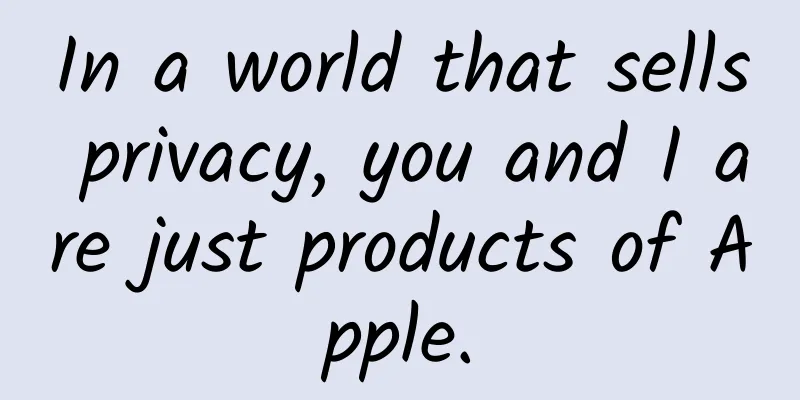In a world that sells privacy, you and I are just products of Apple.

|
Recently, Apple announced that it has won a patent for "pushing advertisements based on income", which aims to "analyze and evaluate the possibility of users purchasing advertised goods or services; then, provide users with advertisements that match their income." This service sounds good, but... Apple has gone back on its word! The Apple that once criticized Google and Facebook for making profits by selling user data; the Apple that once vowed at the Electronic Privacy Information Center (EPIC) that "the business models of many of the world's most important and successful companies are built on selling user privacy. They greedily collect your privacy and then sell it for money. We don't agree with this approach. Apple is definitely not such a company"; the Apple that once made everyone naively believe that it was a privacy defender, finally told all Apple fans with actions, "In fact, you are my product." Where is privacy in the era of big data? Yesterday, Cook told Apple fans with words that "you are not the product"; this year, Apple told everyone with actions that "you are the product", which inevitably makes people feel cold. However, since the Internet and smartphones came into being, we are also drunk. There are several swords hanging over our heads, and we don't know when they will fall and poke us. Zhou Huajian's "No rain, no rainbow" rang in my ears. But where is our rainbow under the storm? In the era of big data, where can we put our privacy? We are constantly exposed to the big data era's dragnet, tracked by the positioning systems of mobile phones, smart wearables and other devices; our online browsing and search records, even our visits to hospitals and shopping, have all become part of the big data system without exception. Collecting is collecting, but these collected data and information about us cannot have a good end. What kind of thing is this? In 2014, the security company Gemalto reported that there were more than 1,500 data leaks, resulting in nearly 1 billion data being exposed. 54% of the data leaks involved user privacy and financial information, a significant increase from 23% in the previous year's report. Overall, data leaks increased by 49% compared to 2013, and the leaked data records were 78% more than the same period in 2013. It was like a nightmare. In 2014, on the first day of the Spring Festival ticket sales, the 12306 Railway Customer Service Center website was down for an hour in the morning. The user account serial number problem broke out, and a large number of user names, ID numbers, mobile phone numbers and other information were leaked. Also last year, Alipay data information was leaked. More than 20G of user information was downloaded by Alipay employees in the background and sold to e-commerce companies and data companies for a fee. Among them, a high-value user information can even be sold for dozens of yuan. What's worse, one month before the 2015 National Postgraduate Entrance Examination, there were hawkings online about the information of 1.3 million postgraduate entrance examination candidates. There is no doubt that the postgraduate entrance examination registration database has been "stripped". It is understood that the data sold not only includes the names and genders of the postgraduate entrance examination candidates, but also sensitive information such as mobile phone numbers, landline numbers, ID numbers, home addresses, zip codes, schools, and majors applied for. The seller's package price for such a huge amount of private information data is 15,000 yuan. Moreover, the sellers at this price are already second-hand dealers, third-hand dealers, or even more. Who fostered this reselling market, and who are the vested interests in this transaction? In fact, at present, there are already "black hands" behind this kind of information trafficking industry operated by companies. They buy personal or unit information from the Internet, and then resell it to others for profit; they buy personal information such as household registration, housing, and vehicles from various channels, and use this as a basis to provide others with marriage, debt collection, mobile phone positioning and other services, and then profit from it; of course, there are also those who promote products by purchasing information. This has been clearly revealed from the calls received by postgraduate students in 2015 about selling test questions, selling answers, and organizing training courses. The lethality of data information is comparable to that of nuclear weapons We are slowly learning to "get used to" the constant invasion of privacy. In this process, there are government intelligence agencies that monitor and control us for political purposes; there are Internet companies that collect and process our data for commercial purposes... Including what Apple said, we use data to target users with ads, which is an advantage because we can provide users with ads that match their income. For this, I can only say "thank you". Because you can know my income status through data information, which means you can know more; you can "share" the income status with advertisers, which means you can "share" more content with customers in need, and in the end it is just a matter of negotiating the price between you. However, these things that you think can make money and are not so serious may cause catastrophic harm to others. This reminds me of Monica Lewinsky. Maybe this case is not the most appropriate, but it was just such an ordinary former White House intern. When her love scandal with US President Clinton was made public on the Internet, she instantly became the object of public humiliation around the world and was labeled as a "whore", "prostitute", "slut", "bitch", "bitch", etc. Fortunately, Lewinsky survived, but not everyone is so lucky. At the TED conference at the beginning of this year, when Lewinsky shared "The Price of Shame" with everyone, she talked about such a case: In September 2010, Tyler Clementi was a freshman at Rutgers University in the United States. The cute, sensitive and creative Clementi was secretly filmed by her roommate having an intimate relationship with another man. When the homosexual video was exposed in the online world, the fire of ridicule and cyberbullying was quickly ignited. A few days later, Tyler jumped off the George Washington Bridge. A life of an 18-year-old was lost. A tragic and senseless death. Some people may think that Clementi's psychological quality is not up to standard. He dares to do it but is afraid of what others say. It's like saying that Bill Gates has billions of assets, so he doesn't mind his bank card number and password being leaked? The reason is just "I am rich, so I am afraid of others thinking about it." In fact, let alone being rich, I don't want others to "think about" my card number and password even if I don't have money. Because it may be the whole wealth of my life. If the information is leaked, if the number on the card is instantly "cleared", everyone should be able to imagine the serious consequences. In the Internet age, the road to privacy protection is long We defend privacy because it is part of human rights. However, the development of technology makes it impossible for us to "maintain privacy", especially facing the cold violence under the development of technology, people are terrified. Even though the road to privacy protection is long, we still need to work hard. In May this year, the first case in China in which a netizen sued Baidu for privacy infringement ended in defeat after two years. During the entire incident, the netizen believed that Baidu recorded the keywords she used in her online searches and placed targeted advertisements on her while she was browsing the web, which violated her privacy rights, right to know, and right to choose. The court held at first instance that the online activity traces of the netizen reflected personal interests, needs and other private information, which fell within the scope of personal privacy; moreover, the relevant prompts of Baidu were very insignificant and could not play a role in standard explanation and reminder, so it was determined that it violated the user's privacy rights. However, during the appeal trial, the Nanjing Intermediate Court ruled that Baidu's personalized recommendation behavior did not constitute an infringement of the netizen's privacy rights on the grounds that "Baidu has clearly informed network users of the use of cookie technology in the "Must Read" and provided users with an exit mechanism, respecting the network users' right to choose" and "once the network activity traces and Internet preferences are separated from the network user's identity, it is impossible to determine the specific information ownership subject, and it no longer falls within the scope of personal information", etc., and revoked the original judgment and dismissed all of Ms. Zhu's claims. Although the Nanjing netizens lost the lawsuit against Baidu for privacy infringement, it was the first step for people to pay attention to and protect their personal privacy on the Internet in the Internet era. In fact, this is quite similar to Apple's push of specific ads based on user income. The Nanjing netizen lost the case, but in the United States, another case about personal information leakage has achieved great success. It is reported that the Federal Communications Commission (FCC) of the United States issued a record fine of 25 million US dollars to AT&T, aiming to punish AT&T for leaking the personal information of nearly 280,000 customers. Regarding this incident, FCC Chairman Tom Wheeler said in a statement: "When an operator relaxes data security supervision and causes the identities of tens of thousands of American customers to be stolen and attacked, the FCC will not remain indifferent - and will not do so in the future. Today's action shows that the FCC will fully oppose companies that fail to maintain the security of customers' personal information." We still need to continue working hard on the long road of protecting privacy rights. In fact, we have been working hard. Network organizations such as Stop the Cyborga, although their actions are a response to the "Google Glass development plan and other similar technological trends", have also, to a certain extent, denounced the cold violence of personal privacy infringement brought about by technological development. |
<<: Will MIUI 7 be Xiaomi's lifeline?
>>: Microsoft releases standalone Android emulator to simulate multiple popular models
Recommend
Is there a "routine" in Alipay? There is actually a big difference between "paying in advance" and "not paying back on time" in Huabei
With the continuous development of the times, man...
Are the times advancing or shrinking? A list of apps that are about to disappear
[[282624]] The software and hardware of mobile ph...
5 ways to boost private education and training traffic
2020 is called the "first year of private do...
How much does it cost to attract investment for the Linzhi Travel Agency Mini Program? What is the investment price for Linzhi Travel Agency Mini Program?
How much does it cost to attract investment for t...
Lingwu SEO Training: What preparations do enterprises need to make for SEO? How can they do it perfectly?
SEO is only one part of the process of increasing...
The operation model of increasing 100,000 followers at 0 cost: budget ≠ resources
We are at a loss in the anxiety of zero budget, b...
How much does it cost to have various videos of African kid mercenaries holding signs and shouting birthday wishes?
Please add customer service WeChat (Wechat): 1867...
Promotion and Marketing | How to quickly generate a landing page with a high conversion rate?
As traffic dividends disappear and corporate cust...
What should be done at each stage of event promotion? You may wish to refer to my experience summary
Essay competitions, regardless of their form, are...
New regulations on supplementary social security payments for rural veterans in 2022: Can they be supplemented? How to make up for it?
Being a soldier is a glorious profession and they...
Tik Tok recommendation mechanism and traffic distribution strategy
As the system streaming algorithm changes, many l...
User operation: build a typical user growth model!
When a product enters its mature stage, its opera...
APP developers, 4 major changes seen at Apple WWDC
Apple's annual Worldwide Developers Conferenc...
With a click-through rate of 6.44%, e-commerce brands leverage WeChat Moments ads to monetize efficiently!
In recent years, with the disappearance of traffi...
The risk level of Sujiatun, Liaoning has been adjusted to low risk, and my country's epidemic prevention and control is nearing its end!
Regarding the reduction of the Notice on the risk...









